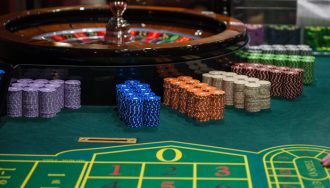Gambling Psychology: Why Some People Gamble Too Much
 Gambling Psychology
Gambling Psychology
- Gambling Psychology
- Psychological Effects of Gambling
- How Gambling Affects the Brain
- Lights and Sounds
- Near-Misses and The Brain
- How Social Factors Influence Gambling Behavior
- Understanding the Cycle of Addiction in Problem Gambling
- Compulsive Gambling Statistics
- Frequently Asked Questions
Gambling is a popular pastime enjoyed by millions of people worldwide. It can be an exciting and thrilling experience, but it can also lead to addiction, financial ruin, and psychological distress. Understanding the psychology of gambling is crucial for anyone who wants to make informed decisions about their gambling habits. In this blog, we will explore the various psychological factors that contribute to gambling behavior, including the role of reward systems, risk-taking, and cognitive biases.
Gambling Psychology
In this blog, we will examine the psychological effects of gambling, including the impact on the brain and the role of near misses. We will also delve into the statistics surrounding compulsive gambling and explore the reasons why some individuals are more susceptible to addiction.
Additionally, we will discuss practical tips for responsible gambling and offer insights into how to recognize and manage problem gambling behaviors.
But before we start, if you want to gamble online at safe casinos, make sure to check out the best legal online gambling sites. Top casinos will have problem gambling tools in place, to help to protect players if they feel their gambling is getting too much.
Psychological Effects of Gambling
The psychology behind gambling is fascinating, and you may be surprised to learn that there are quite a few psychological effects of gambling. The psychological effects of gambling can vary depending on the individual and the extent of their gambling habits.
For some, gambling can be a harmless and enjoyable activity, providing a source of entertainment and social interaction. However, for others, gambling can lead to addiction, financial problems, and emotional distress.
Compulsive gambling is a serious psychological disorder, with estimates suggesting that up to 2% of the population may be affected. It can lead to a range of negative consequences, including anxiety, depression, and relationship breakdowns. Understanding the psychological effects of gambling is essential for recognizing and managing problem gambling behaviors.
Gambling and the Brain
Gambling can have significant effects on the brain, particularly the reward system. The brain’s reward system is activated by pleasurable experiences, such as winning a bet or receiving positive feedback. In response, the brain releases dopamine, a neurotransmitter associated with pleasure and motivation.
Repetitive gambling can lead to the brain adapting to the dopamine release, causing a tolerance to develop. As a result, individuals may need to gamble more frequently or wager larger sums of money to achieve the same level of pleasure.
Additionally, the excitement of gambling can lead to the release of stress hormones, such as cortisol and adrenaline. Chronic stress can have detrimental effects on the brain, including impaired cognitive function and decreased resilience to stress.
Studies have also found that individuals with gambling addiction may have structural and functional abnormalities in certain regions of the brain, including the prefrontal cortex and the striatum, which are involved in decision-making, impulse control, and reward processing.
The Lights and Sounds Entice You
A lot of gambling psychology has to do with the lights and sounds used in casinos and the games you play. Gambling is designed to be a very immersive experience; for example, when you step inside a land-based casino, you’ll likely be faced with flashing lights and loud sounds. Even online casinos attempt to mimic this.
Some studies have suggested that these lights and sounds are effective in making people more impulsive. This can have a direct impact on people having an urge to begin playing. One of the best examples of this is when you’re playing slot machines and catchy jingles play out.
The Effect of Near-Misses
Near-misses are common occurrences in gambling, where a player comes close to winning but ultimately loses. These events can have a significant impact on the brain’s reward system and encourage further gambling behavior.
Studies have found that near misses can trigger the release of dopamine in the brain, like that of a win. This creates a sense of anticipation and excitement, encouraging individuals to continue gambling in the hopes of achieving a win. However, the disappointment of a near-miss can also lead to frustration and further gambling as a means of seeking redemption.
Moreover, near-misses can activate the brain’s cognitive processes, leading individuals to believe that they are more likely to win in the future. This illusion of control can encourage individuals to engage in risky gambling behavior, increasing the likelihood of developing a gambling addiction.
Some game developers who make slots have dedicated psychology experts working with them to look at exactly how to present near-misses in the slot. However, some regulatory agencies – such as the UK’s Gambling Commission – have started to clamp down on this, and now put limits in place on how near-misses can be displayed within a game.
How Social Factors Influence Gambling Behavior
Social factors significantly influence an individual’s gambling behavior. Gambling is a form of social activity, with many games and activities taking place between individuals or groups around the world.
This means that there are often strong connections between people who gamble, which can lead to group norms developing in relation to how much they should bet and what kind of stakes they should play for – all of which have a direct impact on an individual’s behavior when it comes to gambling.
Moreover, different socio-economic backgrounds may also cause various levels of access or exposure to certain types of gambling (such as online versus land-based casinos), plus societal attitudes towards gambling can affect a person’s decision making when it comes down to betting.
For example, some cultures might view betting more favorably than others leading those within that culture statistically having higher rates for playing such games compared against other demographics outside their community.
Additionally, influences like family ties also determine whether someone will take part in any type of wagering at all; if parents disapprove then children are less likely to even start considering participating regardless of how old they are.
Understanding the Cycle of Addiction in Problem Gambling
The cycle of addiction for problem gambling can be an insidious one. It typically starts with a period of increased involvement in various forms of wagering, from lotteries to sports betting. This is usually accompanied by a short-term thrill and release from stress.
However, it’s often followed by an inability to stop or control the behavior despite mounting losses or other negative consequences such as debt, relationship issues and job loss associated with problem gambling activity.
As participants lose more money and experience more guilt about their behavior they may begin engaging in “chasing” habits where they attempt to win back their losses through aggressive risk taking which can easily lead to further financial troubles if not managed properly.
These behaviors increase emotional distress and desperation, leading them deeper into the spiral of dependency on gambling.
Compulsive Gambling Statistics
Compulsive gambling is a major problem that affects many individuals and communities across the world. Recent statistics show that an estimated 2-3 percent of adults in the United States meet criteria for being classified as having a gambling disorder.
This equates to millions of people who struggle with compulsive behavior relating to betting, wagering, or gaming activities. Research has also demonstrated higher rates among certain subgroups such as adolescents, older Americans and military personnel who have been deployed abroad.
The costs associated with this condition can vary from financial losses to impacts on physical health, family life and mental wellbeing. These issues have devastating effects which highlight why it’s so important we all take responsibility in curbing this issue by understanding these damaging figures and ensuring appropriate support structures are available for those affected.
If you’re interested in which countries gamble the most, check out the table below:
| Country | Average Gambling Loss Per Adult |
|---|---|
| Australia | $1,288 |
| Singapore | $1,174 |
| Ireland | $588 |
| Canada | $568 |
| Finland | $553 |




